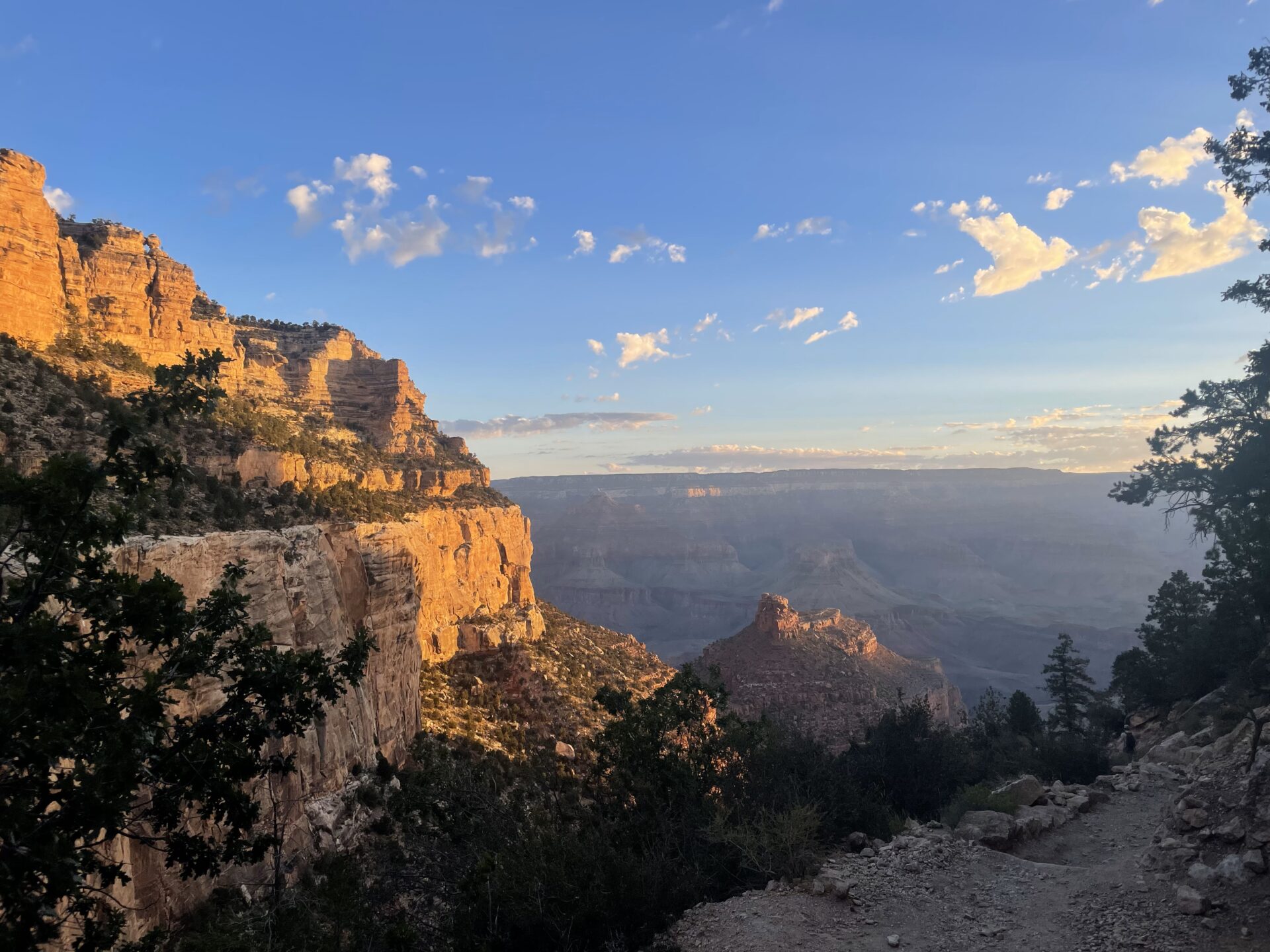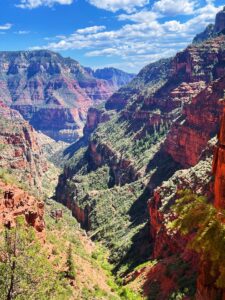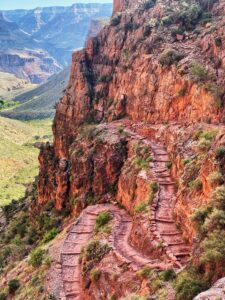
View across the Grand Canyon.
Photo by Lauren L. Ng
Help, please.
This was by far the most difficult physical challenge I’ve undertaken. There were two times during the experience that I actually feared for my life. It was so hard, in fact, that upon emerging victorious at the North Rim, I wept.
After I got home, friends would say, “Wow! You are hardcore.” My answer was “Not really. I just knew when to ask for help.”
Those of us who are ministry practitioners are great at inviting those in our care to ask for help when they need it. We are often less adept at receiving this wisdom for ourselves.
While on my Grand Canyon hike, I asked for help a lot. I asked for help carrying some weight when after hiking for 8+ hours, my pack started to feel too heavy. I asked for help when I developed four pesky blisters and needed my friend to help me bandage them up. I asked for help when on the last day — a 6,000-foot slog back up to the top of the canyon in full sun — I ran out of water. A friend gave me his last half liter and then went ahead of me to find more for both of us. I asked for help a lot.
My willingness to ask for help was rooted in three things that life has taught me, and that the Canyon was quick to remind me of:

Photo by Lauren L. Ng
-We are not in control. Even the best training and planning cannot prepare you for what life has in store. I trained for my backpacking trip for months, hiking with my full 40-pound load, running on my treadmill, and breaking my shoes in. Our group planned diligently, mapping out our days, securing permits, and reading everything there was to read. And still, there were insect bites, significant injuries, and challenging interpersonal dynamics. And I already mentioned E. coli. This is life, isn’t it? The prophet Jeremiah spoke the words, “I know, O Lord, that the way of human beings is not in their control, that mortals as they walk cannot direct their steps.” (Jeremiah 10:23) The unpredictable happens and it can be scary as all get out. Remembering that the best laid plans will inevitably require modification keeps us humble enough to ask for help when we need it.
-We are not invincible. Being in the wilderness reminds you of how thin the line between life and death really is. When our water sources were dwindling, we could feel our heads getting foggier from the dehydration. When we witnessed a helicopter rescue on a beach of the Colorado River, we were reminded of how fragile our bodies can be in extreme conditions and environments. Our bodies, minds, and spirits have their limits. When we reach them, it becomes easier to ask for help. Jesus died and rose again because God knew we could not do it alone. Psalm 121 says, “I lift up my eyes to the mountains—where does my help come from? My help comes from the LORD, the Maker of heaven and earth.” (Psalm 121:1-2 NIV) Sometimes we need to find ourselves in the valley, or the depths of a canyon, to be reminded that we are not invincible and therefore, need to turn to the Lord for help.
-And the final lesson…We are not solitary beings. In the Canyon, a successful through hike depends on the provision, wisdom, and generosity of others. Those who first blazed the trail and those who tend to it, clearing obstacles and installing emergency call boxes and safe places to set up camp. Those who tell you about a better route to take and those who share precious resources like water, a protein bar, or medicine in your time of urgent need. Paul wrote in his first letter to the church in Corinth, “If one member suffers, all suffer together with it; if one member is honored, all rejoice together with it. Now you are the body of Christ and individually members of it.” (1 Corinthians 12:26-27) When we remember that we as humans comprise a web or a constellation of stars, that we operate as a networked whole rather than as individual parts, we remember that everything we do affects others. This includes asking for help— when we seek help for ourselves, we are helping others in the process.

Photo by Lauren L. Ng
Let me say one additional thing here. Sometimes we cannot ask for help for ourselves. As the family member of someone who has struggled considerably with their mental health these last few years, I unfortunately know what it is to hear someone you love tell you that they have no desire and no strength to go on. This is where the networked body of Christ compels us to sometimes seek help for others when they cannot seek it for themselves. We depend on one another through Christ for all things, which includes asking for help.
I’d like to leave you with three questions to ponder:
First, in what areas of your life do you need to relinquish some control? How might doing so open you up to receiving help from others?
Second, when was the last time you were reminded of your mortality — your non-invincibility? What did that moment teach you about asking for help?
Third, we are a constellation of stars. Think of an area of your life where you have been hesitant to ask for help. How might doing so, in turn, end up helping someone else?
Heavenly Creator, our help in ages past, our very present help on this day, and our hope and promise for the future, you have taught us what it is to rely wholly on you, and on one another in you. May we ask for help for ourselves as easily as we seek it for others. May we call upon you in our own lives as promptly as we call upon you for others. May we love and care for ourselves as freely as we love and care for others.
Indeed, we lift up our eyes to the hills—where does our help come from? Our help comes from you, LORD, the Maker of heaven and earth. You who watch over us will neither slumber nor sleep and the sun will not harm us by day, nor the moon by night. Amen.
The views expressed are those of the author and not necessarily those of American Baptist Home Mission Societies.



